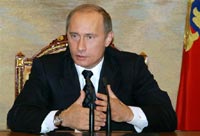Putin hails Russia's rising economic muscle at end of short European tour
Russia's growing economic power has made it less vulnerable to outside pressure, President Vladimir Putin said after completing a short European tour of Austria and Luxembourg.

"There are fewer and fewer ways to influence and pressure Russia," Putin told reporters Thursday at the end of the two-day trip to Austria and Luxembourg, where he signed several energy and investment deals to illustrate the increasing health of Russia's economy.
"There are few ways to influence Russia but the best way is to respect one another," he said after talks with Luxembourg Prime Minister Jean-Claude Juncker, which included exchanges on Russia's handling of human rights.
Putin again criticized plans for U.S. missile defense system in Eastern Europe and sought to drive a wedge between Washington and Europe by insisting European capitals had not been properly consulted.
"We ask our American friends: 'have the Europeans asked you for this?' We get no response," he said through a translator. "It was not pretty."
He was just as soothing when he said the issue should be discussed "without hysteria" in a forum like the Vienna-based Organization for Security and Cooperation in Europe, a major trans-Atlantic security and democracy body.
The Russian president also came with an outstretched hand to Europe, seeking to put a cantankerous EU-Russia summit in Samara behind him, arguing the fundamentals in cooperation had not been affected despite harsh criticism of his human rights record.
"Yes, there are problems, tough questions. But we try to solve them together. It is only natural," he said.
Russia's increasing business with EU nations like Austria and Luxembourg come at a time of increasingly awkward political ties between Moscow and the 27-nation bloc, highlighted this week by Russia's refusal to extradite a Russian suspect in the poisoning death last year of Kremlin critic Alexander Litvinenko in London.
Other issues include the complicated trade dispute with Poland over meat imports; energy cutoffs to neighbors during price disputes over the past few years; Russia's threat to veto a Western-backed plan for Kosovo's independence in the U.N.; and Western concerns over human rights issues in Russia.
Relations between the West and Russia have chilled in recent years as Putin has tightened his grip on power at home and grown bolder on the international stage.
And because of the economic boom, Putin no longer feels restrained from letting Moscow run its own independent course.
Putin said an annual economic growth rate of 7 percent or more, a healthy inflow of capital into the Russian economy and a ballooning cash reserve mean Russia has the luxury to set its own agenda.
Juncker also sought to play down the differences.
"We have to see our relations in rational terms instead of focusing on the pleasure that some find in over-dramatizing it," said the Luxembourg leader.
Trade between Russia and Luxembourg has more than tripled over the past three years and totaled euro241 million (US$325 million) last year, Luxembourg officials said. The Grand Duchy has long been a European banking magnet and financial services are an increasingly important link between the two nations.
Subscribe to Pravda.Ru Telegram channel, Facebook, RSS!


